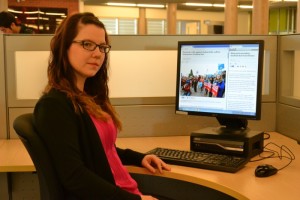The Camosun College Student Society (CCSS) claims that minister of advanced education Andrew Wilkinson made statements regarding BC student debt in a February 3 Times Colonist article that were misleading or unrealistic.
Specifically, the CCSS is concerned about Wilkinson’s claim that 61,000 students receive financial assistance. The CCSS says that this is representative of less than 20 percent of students enrolled in postsecondary in BC.
The minister has also been quoted saying that 70 percent of eligible students in the public postsecondary system do not make use of loans from the BC government, and cited a 2014 survey conducted by BC Stats.
But CCSS external executive Andrea Eggenberger is confused by the numbers Wilkinson came up with in the article. She says that, looking at the same data, she has come up with very different figures.

“This 2014 student outcome survey from BC Stats clearly states that over half of students use loan funding for their education, and 50 percent of those students use combined borrowing methods,” says Eggenberger. “There is no way that 70 percent of eligible students, as Andrew Wilkinson said, don’t make use of loans from the BC government, because, according to this survey, they do.”
The Minister of Advanced Education declined to speak on the phone to discuss the specific concerns the CCSS has; he replied to Nexus’ request for an interview with a statement via email.
“A postsecondary education is one of the smartest investments that you can make, whether it is a diploma, a skilled trade, or a degree,” says Wilkinson. “There are a range of initiatives to keep postsecondary education affordable and accessible for all students. Initiatives range from more than $10 million in up-front, non-repayable Adult Upgrading Grants this year alone through to open textbooks that have saved over $1 million for more than 11,500 students. For students who do access government financial assistance, the Repayment Assistance Plan allows low-income applicants to pay back what they can reasonably afford, and for some borrowers, the principal may be reduced or eliminated entirely.”
According to the ministry, there are 430,000 students enrolled in public postsecondary education, and only 180,000 of them are full-time (and therefore eligible for student financial aid). The ministry says that only 45,000 of those eligible students received financial aid, which, they claim, works out to be 25 percent of the student body.
The CCSS is also concerned about statements made by the minister regarding the mandated two-percent tuition-fee-increase cap. The CCSS says that students attending Camosun are witnessing the Ministry of Advanced Education’s allowance of tuition-fee increases that go above and beyond the two percent.
“Where government funding once totalled 80 percent back in 2001, it now only funds 49 percent, and the rest is coming from students,” says Eggenberger. “The college is trying to get around this two-percent tuition increase by implementing fees, and the government has been letting them do this.”
But there is a dispute regarding the numbers: the ministry says that colleges in BC are staying within the two-percent increase, but student groups have been vocal in their belief that the institutions are raising tuition above the two percent.
The ministry cites Statistics Canada, saying that tuition increased by only two percent and that it was less than the national average of 3.2 percent.
The final point of contention the CCSS has with the statements in the Times Colonist article is that the minister referred to student loans as interest-free. The CCSS claims this is misleading; they said in a press release that interest kicks in after graduation, and students are expected to pay prime plus two percent. (It was later brought to their attention that the interest rate had been increased to prime plus 2.5 percent.)
The ministry says that the quote from Wilkinson about “interest-free government student loans throughout their studies” is accurate because student loans are interest-free while the loanee is at school, with interest of prime plus 2.5 percent starting on completion of a person’s studies.
The CCSS argues that even though student loans don’t accrue interest while a person is in school, it is misleading to students to hear the words “interest-free” when referencing student loans, as the loans do end up acquiring interest. The CCSS goes on to say that they would like to see student-loan management systems that other provinces use implemented in BC.
“There are three provinces in Canada–PEI, Nova Scotia, and Manitoba–whose loans are interest-free,” says Eggenberger. “Ours are not because we have interest while we are paying back our loans.”
